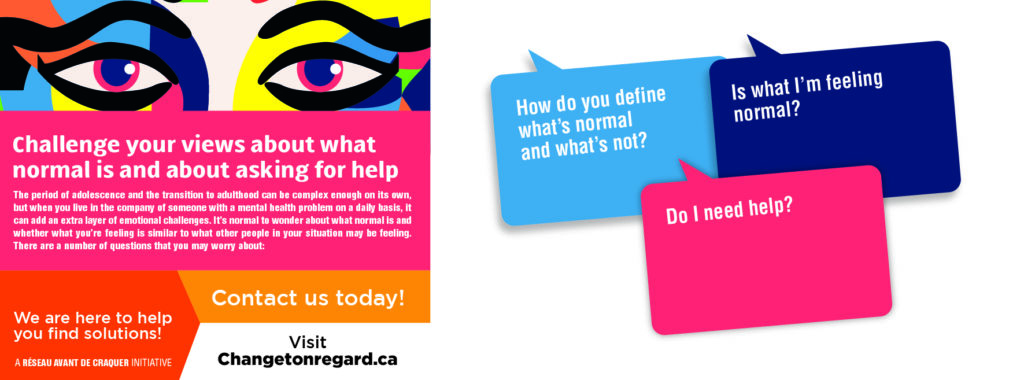Challenge your views about what normal is and about asking for help

The period of adolescence and the transition to adulthood can be complex enough on its own, but when you live in the company of someone with a mental health problem on a daily basis, it can add an extra layer of emotional challenges. It’s normal to wonder about what normal is and whether what you’re feeling is similar to what other people in your situation may be feeling. There are a number of questions that you may worry about:
How do you define what’s normal and what’s not?
The notion of what normal looks like is complex and subjective, as it can vary according to culture, society and the individual. Defining what is normal and what is not can be tricky, as there are no universal criteria. It’s perfectly normal to experience a wide range of emotions, but it can be difficult to know whether what we’re feeling is normal or not in certain situations.
Living with or being close to someone with a mental health problem can bring specific challenges, but that doesn’t mean your situation is abnormal. What you’re experiencing as a mental health ally may seem unusual compared to what your friends or other people your age are going through. However, it’s important to understand that every family has its own dynamics, and that there’s no single model for normalcy.
If you can function satisfactorily in your daily life, maintain positive relationships and experience a general sense of satisfaction, you’re probably in a zone of comfort and normalcy. However, if you’re experiencing significant difficulties that interfere with your daily life or emotional well-being, or if you’re feeling a heavy mental burden, then it’s essential to seek help and support.
Many young people and young adults face similar difficulties, and it’s vital to remember that you’re not alone in this experience.
Is what I’m feeling normal?
Whether it’s joy or anger, every emotion is normal and part of a particular process. So, it’s perfectly normal to experience a wide range of emotions in response to different life situations. Remember that our emotions send us messages and signals. They’re not there by chance. For example, living with someone with a mental health problem can give rise to complex and contradictory emotions. You can feel anger, sadness, guilt, confusion, frustration, love and devotion to the person. All these emotions are valid and are part of the experience of living with a person with a mental health problem. Take the time to recognize, understand and validate your emotions, whatever they may be, without judging them. Talking about your feelings with a trusted friend, family member or counsellor can often help you better understand and manage your emotions.
Take the time to consider the frequency, intensity and duration of your emotions. For example, it’s normal to feel sad after a loss, but if the sadness persists over a long period of time and significantly affects your daily life, it may be a sign that you need extra help.
Do I need help?
As the ally of someone living with a mental health problem, you may feel overwhelmed at times. Asking for help doesn’t mean you’re weak; on the contrary, it shows that you’re aware of your needs and want to take care of yourself as much as the other person.
Here are some signs that you may need help:
- You have trouble dealing with your emotions on a daily basis.
- You feel great worry, persistent anxiety or a constant sense of helplessness.
- You feel overwhelmed by the responsibilities of your role as an ally. You’d like to take a break, but you don’t know how.
- You see that it’s having an impact on you, your personal relationships, your studies or your work and you want this to change, but you don’t know where to start.
If you recognize these signs within yourself, don’t hesitate to ask for help. There are many resources available for loved ones living with someone with a mental health problem. Online or local support groups can be a safe space to share your experiences with others in a similar situation. If you’re interested, visit www.aidersansfiltre.com.
There are also counsellors who can offer support, resources and advice to help you cope with your emotions and difficulties. They can also help you develop strategies to deal with your challenges. It’s free and confidential. Don’t forget that you’re not alone in this experience. One in five young people lives with a parent with a mental health problem. You have the right to get the support and help you need to get through this time in your life. You’re important, and taking care of your mental health is essential to your ability to support others in a caring way that respects your personal well-being, throughout your whole life.






























